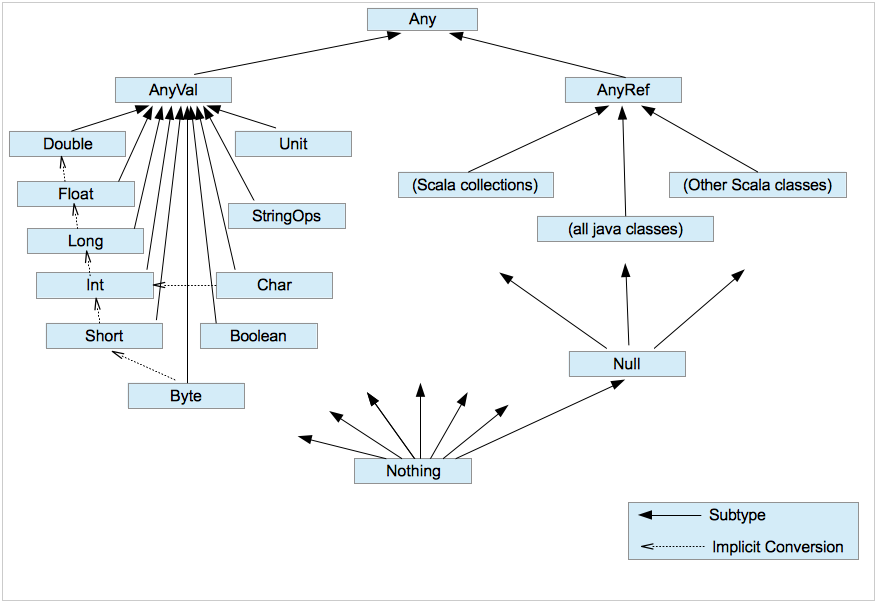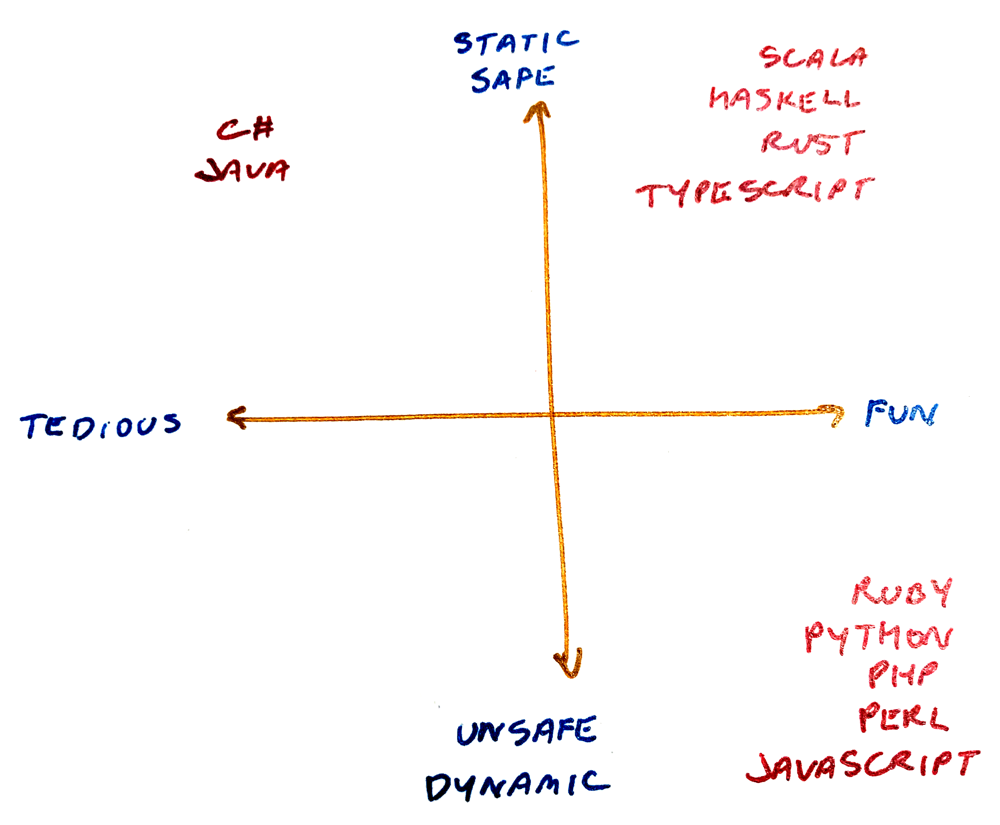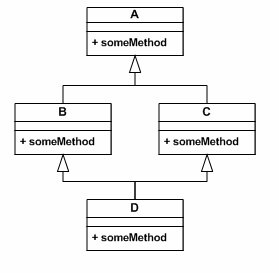자바 개발자를 위한 Scala
대상 : 이 글은 자바에 익숙하며, 스칼라로 당장 개발해야 하는 자바 개발자를 위해 쓰여졌습니다.
목표
Scala의 기본적인 문법과 서비스에서 주로 쓰일 라이브러리, 주의사항 등을 다룹니다.
또한, 자바를 기준으로 스칼라의 구현체계 및 방식에 관해 설명합니다.
타입 및 변수
타입들
- 일반적으로 알고 있는 타입들 : Int, Float, Double, Byte, Char, Boolean
- Java에서는 예약어인 void, null
Scala에서는 Unit (void와 비슷함), Null (null과 비슷함), Nothing, Nil의 타입으로 정의되어 있다. 모든 것들이 타입으로 정의되어 있다.

변수 선언
- Scala의 변수 선언을 보기전에, Java의 변수 선언을 생각해보자.
String str = "Hello"
Integer num1 = 1; - Javascript의 변수 선언과 비교해보자.
var str = "Hello"
var num1 = 1 - Scala는 Javascript와 같은 dynamic type 언어처럼 편하게 사용하되, Java와 같은 Strict type의 장점을 살리고자 하는 언어이다.
장점
Compile time에 오류를 발견할 수 있다.
IDE의 도움을 받을수 있다.

- 그래서 아래와 같이 dynamic type 언어처럼 선언하되, 타입 생략이 가능하다.
val num1: Int = 1 // 타입을 기술
val num2 = 2 // 타입을 생략 - 타입이 생략된 변수들은 어떻게 처리되나?
-> 실제 타입 추론은 compile time에 일어난다. - 변수 선언 방법은 2가지가 있다. 하나는 var, 다른 하나는 val을 이용하는 것이다.
var : mutable variable (var)
val : immutable value (val)
var num1: Int = 1
val num2: Int = 2
num1 = 2
num2 = 1 // ERROR! -> 둘 다 사용 가능하나, 함수형 프로그래밍(functional programming)의 특성을 살려 immutable하게 val을 사용하자
정리
- 스칼라의 변수 선언은 다음과 같이 한다
val n: Int = 1 - var를 쓸수 있으나 쓰지말자
제어문
If
- Java의 if 문을 생각해보자
String str = null;
if (num > 10) str = "bigger";
else str = "smaller"; - Scala도 아래처럼 구현할 수 있으나,
구현시 var를 사용하고 있다면, 내가 산으로 가고 있는 것은 아닌지 한번 정도 고민해보자.
그럼 어떻게 해야 될까?
var str = "";
if (num > 10) str = "bigger";
else str = "smaller"; - Scala의 if-else 문은 값을 리턴한다. 아래와 같이 수정해보자.
val str = if (num > 10) "bigger" else "smaller" - 값을 리턴한다는 것이 어떤 의미가 있을까?
If-else는 statement가 아니라 expression이다.
statement : 컴퓨터가 수행하는 명령 단위
expression : 값을 생성하거나 리턴.
-> 모든 expression은 항상 같은 값을 리턴하므로, 값으로 치환하거나 합성 가능하다. 이는 대수방정식을 풀때처럼 함수적으로 프로그래밍이 가능하다는 것을 의미한다.
Scala에서는 definition을 제외한 모든 식이 expression이다 (statement가 존재하지 않는다)
for
- Java의 for문을 생각해보자.
for (int item : list) {
System.out.println(item);
} - 물론 아래와 같이 구현할 수 있으나 이렇게 사용할 일이 없다.
Scala의 for는 우리가 생각했던 그 for문이 아니다.
무엇이 다른지는 아래에서 살펴보고, 일단 for가 있다는 사실만 알아두자.
for (item <- list) {
print(item)
} - 또한 If-else와 마찬가지로 값을 반환한다.
val list = List(1,2,3)
val increased = for (item <- list) yield (item + 1)
// increased = List(2,3,4) case
- Java의 switch-case 문과 같은 match-case가 있으나, break가 따로 없다
어느 case에도 해당되지 않은 값이라면 에러를 발생시킨다
num match {
case 1 => "one"
case 2 => "two"
case _ => "many" // switch-case의 default와 같은 역할을 한다
} - 자바의 switch-case보다 더 다양한 기능이 있으나, 지금은 match-case라는 것이 있다는 것만 알아두자.
정리
- 스칼라의 제어문에는 if-else, for, match-case이 있다. (while, break 있으나 쓰지말자)
- match-case 문에는 break가 없으며, 대응되는 case가 없으면 MatchError가 발생한다.
Function
선언
- 함수 선언은 아래와 같이 한다.
def myFunc1(n: Int): Int = {
n + 1
}
def myFunc2(n:Int, s: String): String = {
s + n
} -
return을 명시해도 되지만 따로 하지 않아도 마지막 값이 리턴된다.
Java의 method 선언과 달라서 헛갈릴 수 있지만,
Scala의 선언문은 변수 선언이나 함수 선언 둘 다 구조가 동일하다는 점을 기억하면 쉽다.

-
변수 선언과 마찬가지로 리턴 타입을 생략할 수 있다.
val a = 10 // 리턴 타입 Int 생략함
def b(n: Int) = n + 1 // 리턴 타입 Int 생략함 Higher order function
- 함수는 파라미터로 전달되거나 결과값으로 리턴될 수 있다.
def func() = {
def innerFunc(n: Int): String = n.toString
innerFunc _ // 함수를 리턴
} 함수 타입
- 현재
func()의 리턴 값이 생략되어 있는데, 리턴 값은 무엇일까?
-> 이 함수의 타입은 무엇인가?
def func(): Int => String = { ... } Int => String 란 Int를 인자로 받아서 String을 반환하는 함수 타입이란 의미이다.
아래의 function type에 대해 생각해보자.
String => Int
Int => Unit
(Int, String, Double) => Int
Int => (Int, String)
무명 함수 (Anonymous function)
- 무명 함수를 정의할 수 있다.
위에서 정의한 함수 b를
def b(n: Int) = n + 1 무명 함수로 정의해보자
(num: Int) => num + 1 연산전략
- 잠깐 여기서
=>기호를 살펴보자. 함수를 표현하는데 왜=>기호를 사용할까.
아래 예를 살펴보자. (문법에 맞는 예제는 아니다. 컴파일되지 않는다, 참고만 하자)
def func(): Int = throw Exception
a = func() // ERROR 발생.
b => func() // 이 시점에서는 ERROR가 발생하지 않는다. - 컴파일러 입장에서 보면 a, b 둘다 Int로 수렴하는 값일 뿐이며, 연산전략만 다르다.
=>는=와 같은 할당 연산자에서 연산전략만이 다르다는 것을 표현한다.
=를 사용하는 a의 경우 바로 연산하고,
=>를 사용하는 b의 경우 나중에 연산한다.연산전략이 다르다는 얘기는 사실이지만 기호에 대한 내용은 추측이므로, 이해를 돕기위한 참고로만 사용하자;
FunctionN
- 위와 같은 특성때문에 Scala에서는, 상속받은 함수를 변수로 변경할 수 있다.
이것이 어떻게 가능한지 알아보기 위해 FunctionN에 관해 잠깐 살펴보자. - 위의 코드를 다시 살펴보자.
def func(a: Int): Int => Int =
(b: Int) => a + b - Scala도 결국에는 JVM 머신 위에서 동작한다.
Int => Int도 Java로 실행가능한 bytecode로 변환해야 할텐데,
그렇다면Int => Int은 객체로 어떻게 표현될까.
자바의 lambda 식을 생각해보자.
public Function<Integer, Integer> func(int a) {
return (b) -> a + b;
} - 위의 func의 리턴 타입은
interface Function<T, R>이다.
스칼라도 비슷하게 FunctionN 객체를 사용하여 표현할 수 있다.
def func(a: Int) = new Function1[Int, Int] {
def apply(b : Int) : Int = a + b
} Int => Int 는 사실 Function1[Int, Int] 의 축약형이다.
- 아래 코드는 어떻게 변환할 수 있을까?
def func(a: Int) = {
(b: Int, c: Int, d: Int, e: Int) => a + b + c + d + e
} - 파라미터 4개를 받는 Function4를 사용하여, 다음과 같이 변환할 수 있다.
def func(a: Int) = new Function4[Int, Int, Int, Int, Int] {
def apply(b: Int, c: Int, d: Int, e: Int) : Int = {
a + b + c + d + e
}
} - 무식한 방법이지만, 이런 Function이 Function0에서 Function22까지 지정되어 있다.
따라서 위에서 보았던 함수 타입들은 사실 FunctionN의 축약형이다.String => Int
-> Function1[String, Int]
(Int, String, Double) => Int
-> Function3[Int, String, Double, Int]

-> compile time에 FunctionN으로 변환되며, 우리가 직접적으로 FunctionN을 쓸 일은 없다. 참고만 해두자.
함수의 할당
- 다시 무명 함수로 돌아가보자
(num: Int) => num + 1 - 이제 우리는 이 함수가 Function1로 변환되는 객체라는 것을 안다.
따라서 다음과 같이 변수에 할당할 수도 있으며
val a = (num: Int) => num + 1 - 다음과 같이 다시 함수로 지정할 수 있다는 것도 알수 있다.
컴파일러 입장에서는 val이나 def가 연산 방법 이외에 크게 다르지 않기 때문이다.
def a = (num: Int) => num + 1 - 따라서 부모의 함수를 상속받는 경우, 변수로 재정의 가능하게 된다.
처음보면 족보 참 엉망진창이다 싶지만.
FP의 특성과, 변수도 함수도 객체로 변환되는 Scala를 고려한다면 당연하다고도 할 수 있다.
Case문과 PartialFunction
- 이제까지 화살표가 여러개가 등장했다. 헛갈릴수 있지만 다시 정리해보면,
첫번째는 for 문에 쓰였던<-
두번째는 match-case문에 쓰였던=>
마지막 세번째는 함수에 쓰였던=> - 함수에 쓰였던
=>이 기호는 할당 연산자=와 관계가 깊어서=기호에서 변형되었음을 설명했다.
따라서 for 문에서는 왜<=이런 기호를 사용하지 않는지도 이해될 것이다. - 그렇다면 왜 함수에서 사용하는
=>를 case문에 동일하게 사용하나?
num match {
case 1 => "one"
case 2 => "two"
case _ => "many"
} - case 문 각각이 함수이기 때문이다.
case 문 각각은 특정 조건에만 대응하고 이외에는 Error를 발생시키는 PartialFunction이다.
val case1: PartialFunction[Int, String] = {
case n : Int if n == 1 => "one"
}
val case2: PartialFunction[Int, String] = {
case n : Int if n == 2 => "two"
}
val matchFunc = case1 orElse case2 - 왜 case문 각각이 partial function 임을 아는 것이 중요할까?
함수를 인자로 받는 곳에 case문을 쓰는 경우가 종종 있기 때문이다.
items.map(item => item.id) // 이렇게도 표현하지만
items.map { case Item(id, name) => id } // 이렇게 사용하는 경우가 많다. 부분 적용 함수 (Partially applied function)
- 아래의 sum 함수를 이용하여, 값을 1을 증가시키는 inc을 만든다고 해보자
def sum(a: Int, b: Int) = a + b - 물론 아래처럼 구현할 수 있으나
def inc(a: Int) = sum(a, 1) - 굳이 inc라는 함수를 다시 선언하지 않는 방법이 있다.
부분 적용함수를 이용하는 것이다.
val inc = sum(1, _: Int) - sum은 Function2[Int, Int, Int]였다.
(Int, Int) => Int
부분 적용한 sum(1, _)은Int => Int은 Function1의 새로운 함수로 리턴해준다.
따라서 다음과 같이 사용할 수 있다
inc(10) // 11 커링 (Currying)
- 커링이란 여러 파라미터를 가지는 함수를, 하나의 파라미터를 받는 함수 여러개로 나눈 것이다. 아래와 같은 함수가 있다고 하자.
def func(a: Int, b: Int) = a + b - 이를 커링으로 (하나의 파라미터를 받는 함수로) 쪼개자면 아래와 같다.
일단 자바에서의 구현 방법을 살펴보면
public static Function<Integer, Function<Integer, Integer>> add() {
return new Function<Integer, Function<Integer, Integer>>() {
@Override
public Function<Integer, Integer> apply(final Integer x) {
return new Function<Integer, Integer>() {
@Override
public Integer apply(Integer y) {
return x + y;
}
};
}
};
} - 람다를 이용하면 좀 더 간결하게 표현할수 있다.
public static Function<Integer, Function<Integer, Integer>> add() {
return x -> y -> x + y;
} - 스칼라에서도 커링을 사용할 수 있다.
아래와 같이 하나의 첫번째 인자를 받는 함수를 정의하고, 내부에서 다시 함수를 반환할 수 있다.
def add(a: Int): Int => Int = (b: Int) => a + b - 다음 함수의 리턴 타입은 무엇일까?
def add(a:Int) =
(b: Int) =>
(c: Int) =>
(str: String) => (a + b + c).toString + str -> Int => Int => Int => String => String
- 위처럼 인자가 많은 경우 가독성이 떨어질수 밖에 없다.
아래와 같이 간단하게도 정의 가능하다.
def add(a: Int)(b: Int)(c: Int)(str: String): String = (a + b + c).toString + str - 위에서 본 부분 적용 함수의 예를 생각해보자
def sum(a: Int, b: Int) = a + b
val inc = sum(1, _: Int) - 커링으로 표현한다면 다음과 같다
def sum(a: Int)(b: Int) = a + b
val inc = sum(1) 정리
- 함수 선언은 다음과 같이 한다. (return 생략 가능하다)
def func(n: Int): String = {
n.toString
} - 무명 함수 선언은 다음과 같이 한다
(n: Int) => n.toString - 함수 타입은 다음과 같이 표현된다.
Int => Int
String => Unit
(Int, String) => Int
Int => Int => Double => String - 부분적용함수와 커링을 사용하여 함수를 재활용할 수 있다.
def sum1(a: Int, b: Int) = a + b
def sum2(a: Int)(b: Int) = a + b
sum1(1, _)
sum2(1) Class, Object, Trait
Class
- 다음과 같이 User 클래스를 자바로 선언한다고 하자.
class User {
private Integer id;
private String name;
public User(Integer id, String name) {
this.id = id;
this.name = name;
}
public void sayHello() { System.out.println("hello"); }
} - 이를 Scala 버전으로 구현하면 다음과 같다.
class User(id: Int, name: String) {
def sayHello(): Unit = println("hello")
}
val user = new User(1, "name")
user.id // ERROR- 클래스의 내부 필드는 private이며 getter가 필요한 경우 필드 앞에
val을 추가한다.
class User(val id: Int, val name: String) Case class
- class 보다 많이 쓰이는 것은 case class 이다.
case class User(id: Int, name: String)- case class의 모든 필드는 기본적으로 접근 가능하며, new 없이 생성 가능하다.
또한 내용이 같은지를 비교하는 equals과 hashCode를 제공해주고 있어 다음과 같이 사용 가능하다.
val user = User(1, "name")
user.id // OK
new User(1, "name") == new User(1, "name") // true
val copied = user.copy()
copied == user // true- 연습문제 : 다음 java 클래스를 case class로 변경해보자. 링크
class Item {
public Integer id;
public Brand brand;
public Item(Integer id, Brand brand) {
this.id = id;
this.brand = brand;
}
}
class Brand {
public Integer id;
public BrandCategory brandCategory;
public Brand(Integer id, BrandCategory brandCategory) {
this.id = id;
this.brandCategory = brandCategory;
}
}
class BrandCategory {
public Integer id;
public String name;
public BrandCategory(Integer id, String name) {
this.id = id;
this.name = name;
}
}
new Item(1, new Brand(1, new BrandCategory(1, "a")))- case class가 가장 유용한 것은 match-case와 같이 쓰일 때이다.
case class User(id: Int, name: String)
val user1 = User(1, "kim")
val user2 = User(2, "lee")
user1 match {
case User(1, _) => "find user 1"
case User(id, "lee") => "find user with name 'lee'" + id
case _ => "other"
}- 연습문제 : 브랜드 아이디가 1인 경우에만 카테고리명을 출력하고, 그 외에는 empty를 출력하는 함수를 만들어보자. 링크
val item1 = Some(Item(1, Brand(1, BrandCategory(3, "item1 category name"))))
val item2 = Some(Item(2, Brand(2, BrandCategory(4, "item2 category name"))))
def printOnlyBrand1Category(item: Option[Item]) = ???
printOnlyBrand1Category(item1) // item1 category name
printOnlyBrand1Category(item2) // empty
printOnlyBrand1Category(None) // emptyObject
- object는 싱글톤 객체이다.
object Item {
val ERROR_CODE = "500"
}
Item.ERROR_CODE- 동일한 이름의 클래스가 있다면 companion 객체가 되어, 같은 이름의 companion 클래스에서는 object 클래스의 private 변수에 접근 가능하게 된다.
object Item {
val ERROR_CODE = "500"
private val TYPE_1 = "TYPE_1"
private val TYPE_2 = "TYPE_2"
}
case class Item(id: Int, tpe: String) {
def getType(): Int = {
tpe match {
case Item.TYPE_1 => 1
case Item.TYPE_2 => 2
}
}
}
Item.ERROR_CODE
//Item.TYPE_1 // ERROR- companion 클래스를 어디에 사용할 수 있나?
Java 개발시 class 내부에 선언했던 static 변수들을 분리하여 같은 이름의 object 객체에 저장하는데 사용한다. - companion 객체의 private 변수에 접근 가능한 이유는 무엇일까?
Object 객체는 컴파일 시점에 companion 클래스와 병합되게 된다. 따라서 실제로는 동일 클래스의 코드가 되므로 private 변수에 접근 가능한 것이 당연하게 된다.
Trait
- Scala에도 abstract 키워드를 사용하여 추상 클래스를 선언할 수 있다.
그러나 더 많이 사용되는 것은 trait 이다.
trait은 interface와 비슷하나 일부 구현이 가능하다.
trait Shape {
def w: Int
def h: Int
def show(): String = s"w=${w}, h=${h}" // 일부 구현 가능
}-
왜 interface에서는 구현이 불가능하게 되어 있었는지 생각해보자.
Diamond problem이라 불리는 문제 때문이었는데

-
이와 같은 경우 trait에서는 하나의 trait만 main trait만을 상속하고, 다른 trait는 mix-in함으로서 이 문제를 해결한다.
mix-in은 정확히는 상속하는 것이 아니라, 다른 코드를 포함한다는 의미에 가깝다.
결과적으로 하나의 trait만 상속하게 되어 이러한 문제를 해결하게 되는데,
따라서 여러 extends A, B, C 와 같이 표현하는 것이 아니라,
extend A with B with C 와 같이 표현하게 된다.
trait A {
def func: String
}
trait A1 extends A {
override def func: String = "A1"
}
trait A2 extends A {
override def func: String = "A2"
}
class A1A2 extends A1 with A2
class A2A1 extends A2 with A1
val a1a2 = new A1A2
val a2a1 = new A2A1
a1a2.func // A2
a2a1.func // A1정리
- class는 다음과 같이 정의한다
class User(id: Int, name: String)- 보통은 case class를 많이 사용한다.
case class는 내용 비교가 가능하며, pattern matching에 유용하다.
case class User(id: Int, name: String)
new User(1, "name") == new User(1, "name") // true
user match {
case User(id, "lee") => "find user with name 'lee'" + id
case _ => "other"
}-
Object는 싱글톤 객체이며, 동일한 이름의 class를 companion으로 가질 수 있다.
-
Trait은 다중 상속을 가능하게 해주며, 자바의 interface와 달리 내부 구현이 가능하다. (정확히는 다중 상속처럼 보이게 해준다)
Standard library
Option
- Scala에서 null을 사용해도 오류가 나는 것은 아니지만, null을 사용해서는 절대 안된다.
val num: Int = null // 잘못된 코드! - 이를 위해, Java의 Optional과 비슷한 Option이 있다.
val num1: Option[Int] = None
val num2: Option[Int] = Some(1) - 값에 어떻게 접근하나? 기본적으로는 아래과 같이 사용할 수 있다.
이중 1번은 사용하지 말아야 하는 형태이다.
val num: Option[Int] = None
// 1. get
val a: Int = num.get // ERROR!!
// 2. if를 사용한다
if (num.isDefined)
// 오류는 아니지만, 가능한 get을 사용하지 않는 코드로 작성하자
num.get.toString
else
"No Value"
// 3. match-case를 사용한다.
num match {
case Some(n) => n.toString
case None => "No Value"
}
// 4. fold를 사용한다.
num.fold("No Value")(n => n.toString) - 하지만 서비스를 개발할 때를 생각해보자.
값이 없는 경우 default 값으로 치환하는 경우는 많지 않다.
def process(maybeId: Option[Int]): Option[Item] =
maybeId match {
case Some(id) => Some(itemService.get(id))
case None => None
} - 보통 값이 있는 경우만 신경쓰고 싶으므로, 아래와 같이 구현하자. 위와 동일한 결과이다.
def process(maybeId: Option[Int]): Option[Item] =
maybeId.map(id => itemService.get(id)) List
- 리스트는 다음과 같이 사용할수 있다. Nil은 빈 리스트를 표현하는 방법이다.
val nums: List[Int] = List(1,2,3,4)
val emptyList = Nil - 자주 사용하게될 기능을 살펴보자.
// iteration
// 특별한 경우가 아니라면 foreach를 사용하지 말자
nums.foreach(n => print(n)) // 1234
nums.map(n => n * 2) // List(2,4,6,8)
// filtering
nums.filter(n => n % 2 == 0) // List(2, 4)
// 정렬한다.
nums.sorted // List(1,2,3,4)
// 다음과 같이 정렬 방법을 지정해줄 수도 있다.
nums.sortBy(n => n * -1) // List(4,3,2,1)
// 사이즈를 구한다
nums.size // 4
// 조합해서 사용가능하다
nums.filter(n => n % 2 == 0).map(n => n * 2).sum // 12 - reduce하는 방법을 알아보자
// nums가 빈 리스트라면 Error가 발생한다. 아래처럼 사용하지 말자.
nums.reduceLeft((sum, n) => sum + n)
// 대신 초기값을 줄수 있는 fold를 사용하자.
nums.foldLeft(0)((sum, n) => sum + n) // nums.sum과 동일하다 - 값을 추가하거나, 다른 리스트와 병합해보자
val added = 0 :: nums // List(0,1,2,3,4)
val concat = nums ::: List(5,6,7) // List(1,2,3,4,5,6,7) - 리스트의 특정 값에 접근하는 방법을 알아보자.
// nums가 빈 리스트라면 Error가 발생한다. 아래처럼 사용하지 말자.
nums.head // 1
// 대신 headOption을 사용한다.
nums.headOption // Some(1)
// nums가 빈 리스트라면 Error가 발생한다. 아래처럼 사용하지 말자.
nums(2) // 3
// 대신 drop을 사용하자.
nums.drop(2).headOption // Some(3)
// nums가 빈 리스트라면 Error가 발생한다. 아래처럼 사용하지 말자.
nums.last // 4
nums.lastOption // Some(4)
nums.tail // List(2,3,4) - 연습문제 링크
case class Item(id: Int, name: String, price: Int, tpe: String)
val items = List(
Item(1, "아메리카노", 5000, "COUPON"),
Item(2, "아이스크림 케이크", 20000, "COUPON"),
Item(3, "교촌치킨", 15000, "COUPON"),
Item(4, "맥 립스틱", 20000, "DELIVERY"),
Item(5, "라이언인형", 10000, "DELIVERY"),
)
// 1. 모든 상품의 가격을 가져와서 0.1을 곱한 목록을 만들어보자
// 2. 쿠폰인 상품만 가져와 보자
// 3. 가격 순으로 정렬해보자
// 4. 모든 상품을 다음 Data 타입으로 바꿔보자
case class Data(id: Int, name: String, commission: Int)
// 5. 모든 쿠폰 상품들을 Data 타입으로 변환하고, 가격순으로 정렬해보자. Tuple
- python의 튜플과 같이 여러 타입이 혼재 가능한 타입도 있다.
val values = (1, "str", true, 5) - 리스트와의 차이점은 무엇일까? 타입을 살펴보자.
리스트와 달리 타입이 그대로 유지된다.
val list: Seq[Any] = List(1, "str", true, 5)
val first: Option[Any] = list.headOption
val tuple: (Int, String, Boolean, Int) = (1, "str", true, 5)
val num: Int = tuple._1
val str: String = tuple._2 - 튜플이 쓰이는 예를 보자.
val sorted: Seq[(Item, Int)] = items
.sortBy(_.price)
.zipWithIndex
sorted.map {
data => {
val item = data._1
val index = data._2
(index, item.name)
}
}- 앞서 배웠던 partial function, pattern matching을 이용하여 더 나은 코드로 작성해보자.
sorted.map { case (item, index) => (index, item.name) }- 튜플은 값을 추가하거나, 다른 튜플과 병합하거나 할 수 없다.
왜 일까? 튜플과 같이 각각의 타입을 유지하는 목록을 자바로 구현한다고 생각해보자.
class Tuple<A, B, C> {
A a;
B b;
C c;
public Tuple(A a, B b, C c) { ... }
}
new Tuple<Int, String, Boolean>(1, "str", true) - 스칼라의 구현 방식도 크게 다르지 않다.
튜플또한 함수와 같이 Tuple1 ~ Tuple22까지 존재한다.
case class Tuple3[+T1, +T2, +T3](_1: T1, _2: T2, _3: T3) 
- 참고 : shapeless
Map
- Map은 다음과 같이 정의할 수 있다.
val map = Map((1, "a"), (2, "b"), (3, "c"))- 다음과 같이도 표현할 수 있다.
val map = Map((1 -> "a"), (2 -> "b"), (3 -> "c"))- 자주 사용하게될 기능을 살펴보자.
val map = Map((1, "a"), (2, "b"), (3, "c"))
map.get(1) // Some("a")
map.getOrElse(4, "not found") // "not found"
map.contains(4) // false
map.map { case (key, value) =>
s"키=${key}/값=${value}"
}
// List(키=1/값=a, 키=2/값=b, 키=3/값=c)- Map을 정의할때 요소들의 모양이 튜플과 비슷한데, 이건 실제로 Map이 튜플을 사용하기 때문이다.
abstract class GenMapFactory(...) {
def apply[A, B](elems : scala.Tuple2[A, B]*) = { ... }
}->표 기호 또한 실제로는 Tuple의 alias이다.
def ->[B](y : B) : scala.Tuple2[A, B] = { ... }Monad
- 함수형 프로그래밍에서 자주 언급되는 모나드에 관해 알아보자.
과연 모나드란 무엇일까? - Option의 예를 살펴보자.
어떤 Option값이 주어졌을때, 물론 매번 해당 값이 존재하는지 확인하여 (isDefined) 계산할 수 있으나,
val num: Option[Int] = Some(1)
if (num.isDefined) { // 이렇게도 할수 있지만
Some(num.get * 2)
} else {
None
}이 값이 있는지 없는지 확인하는 일은 우리의 관심사가 아니다.
우리에 관심사에만 주목해보자.
val num: Option[Int] = Some(1)
num.map(n => n * 2) - List도 마찬가지다.
목록을 순회하는 것은 우리의 주 목적이 아니다. Map을 사용하여 우리의 관심사만 구현해보자.
val num: List[Int] = List(1,2,3)
num.map(n => n * 2) - Future라고 다르지 않다.
결과값을 기다리던, 기다리다 실패하던 그건 우리의 주 목적이 아니다. 값이 오는 경우 – 우리가 구현해야 하는 그 목적에만 주목해보자.
val num: Future[Int] = Future.successful(1)
num.map(n => n * 2) - 여기서 문제.
F라는 타입이 있다고 하자. 그 것이 List인지 Future인지, Option인지는 아무도 모른다. 내부의 값 Int에 *2를 하려면 어떻게 해야 할까?
val num: F[Int] = ???
num.map(n => n * 2) - List이든 Future이든 Option 상관없다. 우리의 관심사에만 집중하면 된다.
이와 같은 것이 Monad라고 생각하면 된다. - 연습문제 : 다음과 같은 경우가 있다고 하자. Int 값에 2를 곱하고 싶다면 어떻게 해야 하나? 링크
import scala.concurrent.Future
import scala.concurrent.ExecutionContext.Implicits.global
val f: Future[List[Int]] = ??? FlatMap
- 다음은 일반적으로 구현하게되는 상황이다. 상품의 카테고리를 어떻게 가져올수 있을까?
case class Item(id: Int, name: String, categoryId: Int)
case class Category(id: Int, name: String)
def getItem(id: Int): Future[Item]= ???
def getCategory(id: Int): Future[Category] = ???
// 상품의 카테고리를 어떻게 가져올수 있을까?
def getItemCategory(id: Int) = ??? - 아래과 같이 상품을 가져오고, 상품의 카테고리 아이디로 다시 카테고리 정보를 가져와보자.
def getItemCategory(id: Int): Future[Category] = {
getItem(id).map(
item => getCategory(item.categoryId)
)
// Future[Future[Category]] 타입이 달라 에러 발생!
} - 컴파일이 정상적으로 되게 하기 위해서는 다음과 같이 수정되어야 한다
def getItemCategory(id: Int): Future[Category] = {
getItem(id).map(
item => getCategory(item.categoryId)
).flatten
} - 위 보다 좀 더 나은 코드는, map & flatten을 뜻하는 flatMap으로 바꾸는 것이다.
def getItemCategory(id: Int): Future[Category] = {
getItem(id).flatMap(
item => getCategory(item.categoryId)
)
} - 연습문제 : getUserItems을 구현해보자 링크
case class User(id: Int)
case class Order(id: Int, itemId: Int)
case class Item(id: Int)
def getUser(userId: Int): Future[User] = ???
def getOrders(user: User): Future[Order] = ???
def getItem(itemId: Int): Future[Item] = ???
def getUserItems(userId: Int): Future[Item] = ??? For
- 위와 같은 경우 계속해서 callback 지옥에 빠지게 된다.
이러한 문제를 위해서 Scala에서는 for라는 sugar code를 사용한다.
def getItemCategory(id: Int): Future[Category] = {
for {
item <- getItem(id)
category <- getCategory(item.categoryId)
} yield category
} - 연습문제 : 위의 getUserItems을 for를 사용해서 다시 구현해보자 링크

많은 도움이 되었습니다 :)